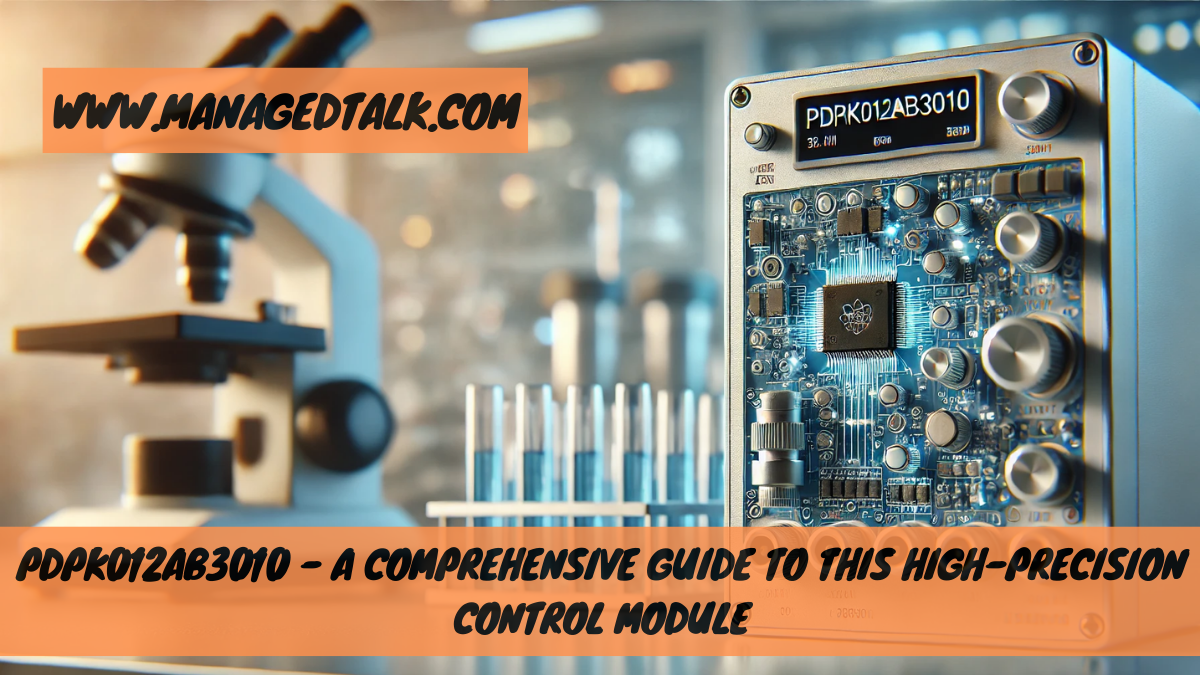Introduction to PDPK012AB3010
The PDPK012AB3010 is a specialized control module designed to meet high standards in various industrial and automation applications. Known for its precision, durability, and versatility, this component has gained recognition among engineers, technicians, and electronics enthusiasts across the United States. Whether in manufacturing, electronic assembly, or automation, the PDPK012AB3010 stands out due to its robust design and reliable functionality.
The “PDPK012AB3010” is a reliable, modern control module widely used for high-precision applications in electronics and automation, offering durability and advanced functionalities for optimized performance.
In this article, we will dive into the specifications, applications, and performance of the PDPK012AB3010. We’ll analyze its advantages, potential drawbacks, and provide insights that extend beyond what is typically available online.
What is PDPK012AB3010?
The PDPK012AB3010 is a programmable control module engineered for precision control in complex electronic systems. This model boasts a solid-state design, excellent response times, and a user-friendly interface that integrates smoothly into diverse setups. Commonly used in environments that require consistency and accuracy, the PDPK012AB3010 has established itself as a trusted tool for professionals in fields like automation, robotics, and instrumentation.
Key Features of PDPK012AB3010
1. High-Precision Control
One of the major benefits of the PDPK012AB3010 is its precision. The module is designed with tight control parameters, allowing it to maintain stable performance even in demanding conditions.
2. Advanced Circuit Protection
Built with advanced protection features, the PDPK012AB3010 safeguards against voltage fluctuations, short circuits, and other common electronic issues.
3. Compatibility with Major Industrial Protocols
This module is designed for compatibility with major industrial protocols such as Modbus and CANbus, making it adaptable to a variety of systems. Its flexibility enhances its utility in large, integrated operations, particularly those that rely on consistent communication between different control units.
4. Compact and Durable Design
The module’s compact design allows for easy integration without taking up excessive space. Additionally, its rugged build makes it suitable for harsh environments, ensuring a long operational life.
Applications of PDPK012AB3010
1. Manufacturing and Automation
In manufacturing, the PDPK012AB3010 plays a critical role in automating repetitive processes, maintaining precise control over production lines, and improving overall efficiency.
2. Robotics and Instrumentation
Due to its responsiveness and high-precision control, this module is widely used in robotics, where fine motor control is essential. In instrumentation, it ensures accuracy in measurements and data collection.
3. Industrial Equipment Control
From conveyor systems to robotic arms, the PDPK012AB3010 enables precise equipment control, allowing seamless synchronization of multiple components.
Advantages of Using PDPK012AB3010
- Reliability: The PDPK012AB3010 is known for its durability and consistent performance, essential for minimizing downtime in critical systems.
- Ease of Integration: Its compatibility with standard industrial protocols and compact form factor make it simple to integrate with existing systems.
- User-Friendly Interface: The module offers an intuitive interface for easy setup and monitoring, catering to both beginners and experts in electronics.
- Cost Efficiency: While offering advanced features, the PDPK012AB3010 remains affordable, making it an attractive option for companies of various sizes.
Potential Drawbacks
- Initial Setup Complexity: Some users may find the initial setup challenging, especially if they lack experience with similar control modules.
- Limited Documentation: While PDPK012AB3010 is highly functional, documentation on advanced features can be sparse, requiring users to rely on support or third-party resources.
- Environmental Sensitivity: Although it’s robust, excessive heat or moisture can impact performance, which calls for well-regulated environments for optimal usage.
Technical Specifications of PDPK012AB3010
| Feature | Specification |
|---|---|
| Input Voltage | 12-24V |
| Output Channels | 2 Digital, 2 Analog |
| Protocol Compatibility | Modbus, CANbus |
| Response Time | < 5ms |
| Operating Temperature | -20°C to 55°C |
| Dimensions | 85mm x 60mm x 25mm |
| Weight | 150g |
How to Install PDPK012AB3010
Step 1: Connect the module to a power source within the recommended voltage range.
Step 2: Link the input and output terminals following the wiring diagram provided in the user manual.
Step 3: Configure settings via the built-in interface or an external controller that’s compatible with industrial communication protocols like Modbus.
Step 4: Run diagnostic checks to ensure all connections and configurations are correct.
Step 5: Integrate into the larger system and test under full operational conditions to verify stability and accuracy.
FAQ Section
Q1: What industries primarily use the PDPK012AB3010?
- Answer: It’s popular in industries requiring precision control, including manufacturing, robotics, and automation.
Q2: Is the PDPK012AB3010 easy to install?
- Answer: Yes, with basic setup instructions, though it may require experience in handling programmable modules for optimal configuration.
Q3: Can the PDPK012AB3010 operate in extreme conditions?
- Answer: It can function within a specific temperature range (-20°C to 55°C), but extreme conditions can impact its longevity and performance.
